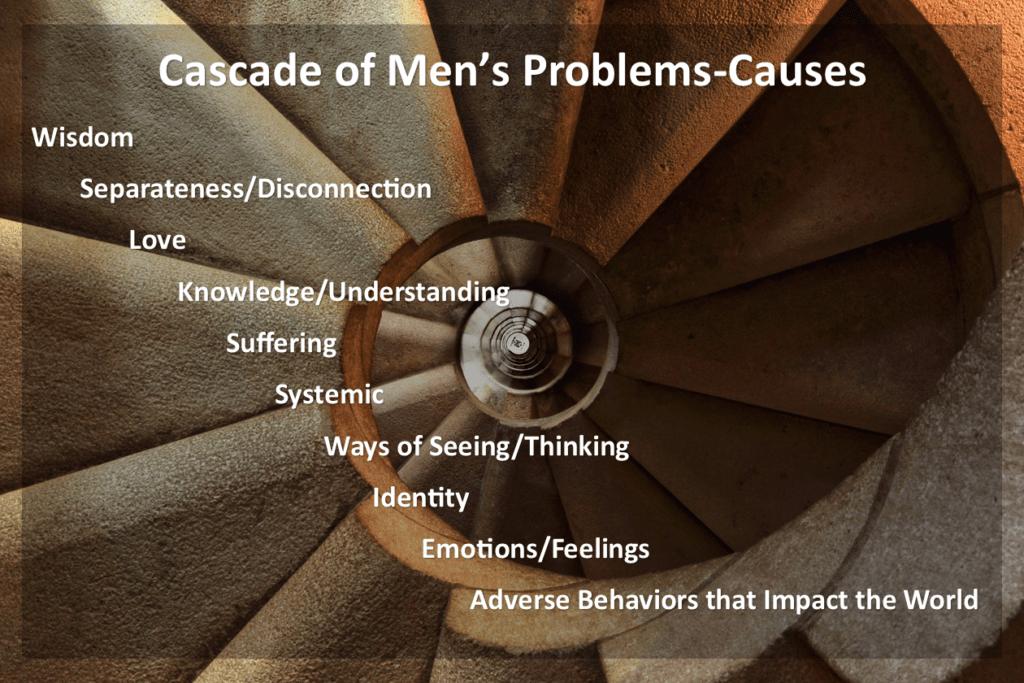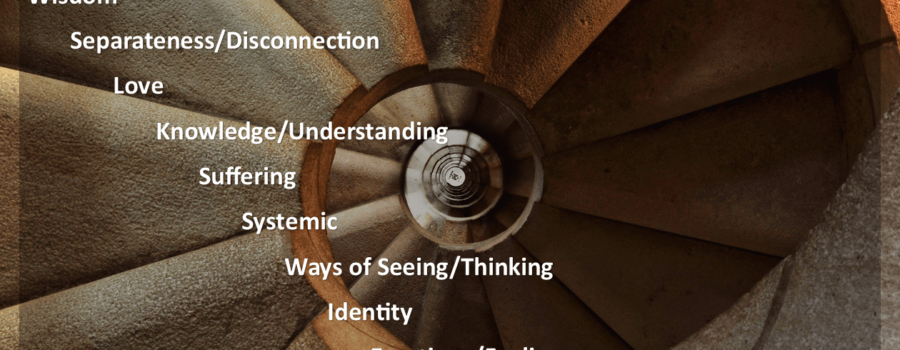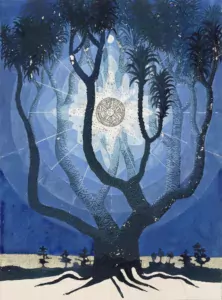Separation vs. Connection
By Jim Burns
No man is an island entire of itself.
Every man is a piece of the continent, a part of the main.
~ John Donne ~
This seems to be the year the mainstream press discovered the problems men face. We’ve seen a deluge of articles, perhaps epitomized by “Men Are Lost. Here’s a Map Out of the Wilderness.” It’s interesting how most are written by women! We can be grateful to them for elevating attention to these issues. Richard Reeves has also published research from his decades-long work at the Brookings Institute in a book titled Of Boys and Men: Why the Modern Male Is Struggling, Why It Matters, and What to Do about It.(1)
Naming the Problem
Of course, Illuman men are pretty familiar with these issues—although perhaps not the full extent and broad implications. In the work of Illuman, we recognize that men need help to name and understand:
- Their specific problems and the core causes
- The actions required to heal
- An invitation to first steps and resources to support their journey
In April, fifty Illuman leaders convened at the John Knox Ranch in Texas to engage these questions.(2) The process we followed was to “name the demons” men face. The graphic below summarizes our findings. Read it from the bottom up. To discover an overarching cause of the multitude of issues men face, we kept asking “Why?” at each level of the “cascade.” Each level includes and transcends the previous.

Separateness was the top-level word we chose to name the root problem men in the US face. Disconnectedness is another way of expressing this condition. Men are disconnected from partners and family, from other men, and even from their own selves.
I recently heard a newly initiated man express this insight that he gained in his Illuman Council circle: “We realized how alienated we are from ourselves. We can’t talk about our problems or relate to other men.”
We identified four important aspects of this separateness:
First, men are disconnected from our inner selves. Self-reflection is threatening to many men. Inner work and self-observation, even if understood, are seldom seriously engaged.
Next, men don’t appreciate their essential spiritual nature. As Teilhard de Chardin is supposed to have said, “We are not human beings having a spiritual experience; we are spiritual beings having a human experience.”
Third, men don’t appreciate their essential relational nature. The myth and model of Western masculinity is the “rugged individualist,” the hero, the Lone Ranger, the “leader” who is above the led.
Last, as a result of the previous three, men are disconnected from the deep needs of the world, the human, the more-than-human, and the physical planet.
Richard Rohr explains further, “The separate self is the problem, whereas most religion and most people make the shadow self the problem. This leads to denying, pretending, and projecting instead of real transformation into the Divine.”(3)
Illuman Provides the Support that’s Needed
Having named the problems men face, we can identify specific actions that address these states of separation. This is why Illuman exists—to offer support for men to overcome separation and find deep connection. Specifically, Illuman offers:
Community: Fellowship with men is an important remedy for separateness and the related problems that result—loneliness, fear, anger, a lack of meaning, addictions, etc. “Relationship First” is a good mantra. The African expression is Ubuntu—“I am because you are. You are because I am.”
Council: The Illuman practice of Council is an easy and immediate first step to experience the fellowship of a healthy men’s community, the power of shared stories, and the importance of learning to listen from the heart.
Inner Work for Transformation: A life-long journey of regular practices are essential for personal growth, change and transformation. “All transformation is relational.”
Deeper Spirituality: Inner work starts with healing wounds, additions and trauma. To become whole, deeply human men requires the ability to mature spiritual capacities, starting with the ability to let go of ways that no longer serve us (releasing).
“Most problems are interpreted psychologically today, but the real solutions are almost always spiritual. Spiritual is a bigger realm than psychological because the individual psyche is precisely that. It’s too individualistic. It’s too small. It’s text outside of context. It’s individual outside of participation.”(4)
Encouragement to Service: In our society, men are often goal oriented. We crave a purpose, a mission worth serving. But too often we choose lesser goals, personal pleasures of economic achievements, rather than those that honor the earth and serve the whole human community. Illuman men follow a higher calling.
Your Mission, Should You Choose to Accept It:
Our world, country, communities, families, and men with whom we regularly engage need our help to reconnect with their inner, spiritual, relational selves and with the deep needs of the world. Let us build connections, convene conversations, invite others to “come see,” and, when they’re ready, invite them to be initiated into the journey through their own Rite of Passage.
Jim Burns is a member of the Illuman Board of Directors and is on the Illuman Communications Committee
—————————————————–
(1) Reeves invites you to learn more about the problems he addresses without reading the book via conversations he had with Ezra Klein, Scott Galloway, and/or Derek Thompson, as well as his summary video on The Fall of Men or his TED talk on “How to solve the education crisis for boys and men.” For an article-length summary, see David Brooks’ article, “The Crisis of Men and Boys.”
(2) We will send more information about all of this as we release an updated Illuman Mission and Vision Statement.
(3) Richard Rohr’s Daily Meditations, “The Price of Individualism,” Center for Action and Contemplation, August 10, 2013.
(4) Richard Rohr, The Enneagram: The Discernment Of Spirits (Introduction), Video, 23:20.







Leave a Reply
Your email is safe with us.
You must be logged in to post a comment.